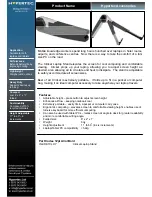
F8x86_64 on the Acer Ferrari 3400LMi
10.3.1 Simple benchmark
In order to compare different settings we need some kind of benchmark tool. A
simple tool that comes with the
glxutils
package found in most distributions
is
glxgears
. It may be rough, rudimentary and lacking a lot of hype features, but
it is present and sufficient for our needs.
An interesting exercise is to explicitly disable hardware acceleration and
comparing the result with the default
xorg.conf
. Without hardware acceleration
glxgears
clocks in around a modest frame rate of 150 FPS, compared with
approximately 2050 FPS for the default configuration. This is quite a difference,
and it verifies that the
radeon
driver really does its job.
10.3.2 Optimization
The default values for most settings work well and there is no needed to modify
xorg.conf
. Furthermore, most of the other settings are correctly autodetected,
such as AGP 8x and memory. All this is reported by the X server in its log file
/var/log/Xorg.0.log
during startup.
The options of most interest for performance are
AccelMethod
(default XAA),
AGPMode
(autodetected),
ColorTiling
(default on) and
EnablePageFlip
(default
off). The first three are correct by default, but due to instability in rare cases
EnablePageFlip
is disabled by default.
Turning on the option
EnablePageFlip
in
xorg.conf
reveals no flaws. I have not
noticed any glitches with this option on my setup so I feel confident in
recommending it. Then the obvious question
How good is it?
It is good!
glxgears
gives us an indication. By enabling
EnablePageFlip
performance is
increased from 2050 FPS to about 3270 FPS. A significant boost for tweaking one
single option.
You only need to add one line to the Device section in the default
xorg.conf
to
boost 3D performance:
Section "Device"
Identifier "Videocard0"
Driver "radeon"
Option "EnablePageFlip" "1"
EndSection
10.3.3 Other observations
During the optimization procedures a few interesting observations were made.
Primarily the CPU speed does not seem to matter. Most tests were run with the
CPU frequency first set to 800MHz, then repeated at 2000MHz. No significant
difference related to the CPU speed was noticed.
Furthermore, the size of the configured virtual screen does not affect
20
















































